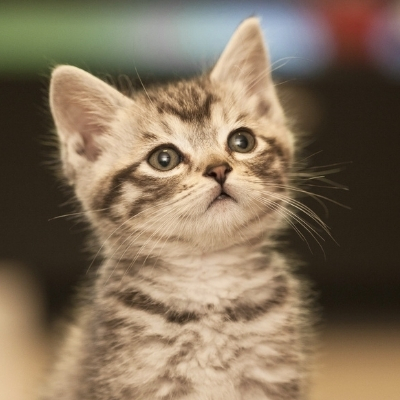Feline vaccinations have been medically proven to combat many preventable diseases and illnesses so it is extremely important to stay current with your cat’s vaccination schedule. Your cat’s Annual Vaccine Schedule should include the following:
Rabies
Tennessee law requires that dogs and cats over 6 months of age be currently vaccinated against Rabies. While Rabies is not prevalent in the State of Tennessee, a small number of cases are confirmed each year (generally in wildlife e.g. bats and skunks) so it is possible for your pet to contract Rabies from an interaction with infected wildlife. Of greater concern is if your pet were to bite someone. In that situation, if your pet does not have a current Rabies vaccine, the pet may need to be quarantined or possibly even euthanized, depending on the circumstances. Therefore it is extremely important that your pet’s Rabies vaccine be kept current. The initial Rabies vaccine is typically administered around 12 weeks of age and then once a year thereafter. Some clinics also offer a three-year vaccine. NOTE: A Rabies vaccine is required for a cat to be in our clinic for any extended period of time e.g. for surgery, bathing, boarding, etc. Please contact our clinic with any questions about the Rabies vaccine.
Distemper
The Feline Distemper vaccine (FVRCP) protects against three different diseases (see below). These infections are highly contagious and some are potentially fatal. Young cats and kittens are especially susceptible. Medical treatment can be expensive and difficult for the pet, so the cost of vaccination far outweighs the risks of not vaccinating. The initial Distemper vaccine should be given between 6-8 weeks of age. After the initial vaccine, our clinic highly recommends a series of two additional boosters, given three weeks apart, in order to provide sufficient immunity.The Feline Distemper should then be given once a year. NOTE: A Feline Distemper vaccine is required for a cat to board in our clinic. Please contact our clinic with any questions about the Distemper vaccine.
- Feline Viral Rhinotracheitis – Feline Viral Rhinotracheitis (FVR) is an infectious disease caused by Feline Herpesvirus Type-1. The virus is spread in saliva and in discharges from the eyes and nose of an infected cat. FVR is a major cause of upper respiratory disease in cats, and is the most common cause of conjunctivitis (inflammation of the tissues surrounding the eye, especially the lining of the lids and the third eyelid).
- Calcivirus – Feline calicivirus (FCV) belongs to a large family of viruses named Caliciviridae, whose members infect a wide range of vertebrate animals, including rabbits, livestock, reptiles, birds and amphibians. FCV occurs most commonly in multi-cat environments. A cat’s risk of exposure is higher in shelters, pet stores, and catteries, where 25 to 40 percent of cats may be carriers. The virus spreads through direct contact with the saliva, nasal mucus and eye discharge of infected cats and through aerosol droplets that spread when cats sneeze. At first the cat will have symptoms that look like a cold, with sneezing, nasal congestion, fever and sometimes drooling. Large amounts of discharge can come from the eyes and nose. In more severe cases, cats can also develop inflammation and ulcers on the tongue, and the lining of the mouth. Lethargy, mild lameness and lack of appetite may also occur.
- Panleukopenia (Feline Distemper) – Feline panleukopenia (FP) is a highly contagious viral disease of cats caused by the feline parvovirus. Kittens are most severely affected by the virus.Cats can shed the virus in their urine, stool, and nasal secretions; infection occurs when susceptible cats come in contact with these secretions, or even the fleas from infected cats.The first visible signs an owner might notice include generalized depression, loss of appetite, high fever, lethargy, vomiting, severe diarrhea, nasal discharge, and dehydration. Sick cats may sit for long periods of time in front of their water bowls but not drink much water.
Feline Leukemia (Felv)
Felv is a viral infection that is only transmitted through close contact, and this vaccine is generally only recommended for cats that go outdoors. Symptoms can include loss of appetite, progressive weight loss, poor coat condition, enlarged lymph nodes, persistent fever, pale gums and other mucus membranes, inflammation of the gums and mouth, and infections of the skin, urinary bladder, and upper respiratory tract. After the initial vaccine, our clinic highly recommends an additional boosters, given three weeks later, in order to provide sufficient immunity. The Feline Leukemia vaccine should then be given once a year. NOTE: A test with a negative result is required prior to this vaccination. Please contact our clinic with any questions about the Feline Leukemia test or vaccine.
Feline Immunodeficiency Virus (FIV)
FIV is a viral infection that is only transmitted through close contact, and can be a concern for cats that go outdoors. Symptoms included enlarged lymph nodes, fever, anemia, weight loss, disheveled coat, poor appetite, diarrhea, abnormal appearance or inflammation of the eye (conjunctivitis). NOTE: While our clinic offers testing for FIV, we do not offer a vaccine. Please contact our clinic with any questions about Feline Immunodeficiency Virus. . Feline Infectious Peritonitis (FIP) There are two major forms of FIP, an effusive, or “wet” form and a non-effusive, or “dry” form. Symptoms can include loss of appetite, weight loss, depression, and fever. FIP is almost always fatal. Most house cats are not at risk of contracting this disease as FIP is most commonly found in catteries and feral colonies, NOTE: There is no test for FIP, nor is there a vaccine. Please contact our clinic with any questions about Feline Infectious Peritonitis.

